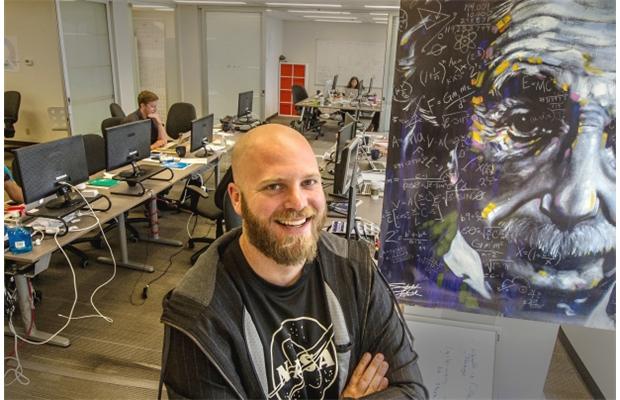A Vancouver company at the forefront of tech innovation has taken a quantum leap in computing, earning a place this month among the world’s top 49 most promising tech pioneers for 2015 at the World Economic Forum.
Sitting at the table with such multinational tech giants as Google, NASA, and Lockheed Martin, Vancouver’s 1QBit is developing software for the new generation of supercomputers being built by Burnaby’s D-Wave Systems.
“We’re in that desirable position of being the little fish in the big pond.”
“We really feel like we’re in that desirable position of being the little fish in the big pond,” said Andrew Fursman, CEO and co-founder of 1QBit. “And for us, because it’s such a brand new field, to come to the same plate as all these other organizations to make the same sorts of contributions is really exciting.”
Quantum computing is the next big jump in computer technology, using quantum bits instead of binary digits to handle computation with more speed and sophistication. In quantum mechanics, a qubit is a unit of quantum information which is able to take advantage of the polarization of a single photon to to be in a superposition of two states at the same time. This is a big advantage over a binary computer, which requires either a 1 or a 0 to store the information.
Fursman says the promise of this emerging field isn’t just that it’s seeing exponential growth, but that it will grow exponentially faster than binary computers ever did. It’s simply a matter of getting in on the ground floor.

Small company. Big ideas.
The big question is: could this small Canadian company become the Microsoft Windows of quantum computers?
That all depends on hiring the best and brightest minds on the planet. Literally.
1QBit says its “quantum software engineers” are composed of the most talented mathematicians, physicists, and computer scientists the company can find.
“So we have quite a broad range of expertise and skills and they often come at problems from different angles and different perspectives,” explained Landon Downs, president and co-founder of 1QBit. “We have the luxury of being able to bounce it off many different schools of thought.”
However, Downs stressed the challenge of working in “uncharted territory” is that those brilliant minds don’t always bear fruit. Which makes it important to keep a “skeptical mindset” to go along with the excitement of developing new technology in order to produce quality, rigorous work.
Fursman says current advances in 1QBit’s software will soon open new opportunities for broad applications in quantum computing for the fields of life sciences, the energy industry, social network analysis and financial markets. 1QBit is also looking to partner with drug companies to explore how its research in comparing three-dimensional shapes can open up new avenues to advance the field of computational drug discovery.
The Future is Now.
Fursman says quantum computing isn’t a futuristic technology but one that will soon be available to the regular person in everyday applications.
“What people want isn’t quantum computing, they want better answers to their problems for less money on a shorter time frame,” he said.
That means when you punch in coordinates to a UPS delivery app on your iPhone, it will be seeking answers from the “quantum cloud” and come back with the results without the user ever having considered the technology.
“We really think that quantum computers won’t be truly successful until you don’t even know you’re using them. When it’s just sort of some backend process that takes place… nobody cares, they just want to know to turn left at the next intersection.”
Andrew Fursman photo courtesy Steve Bosch.


